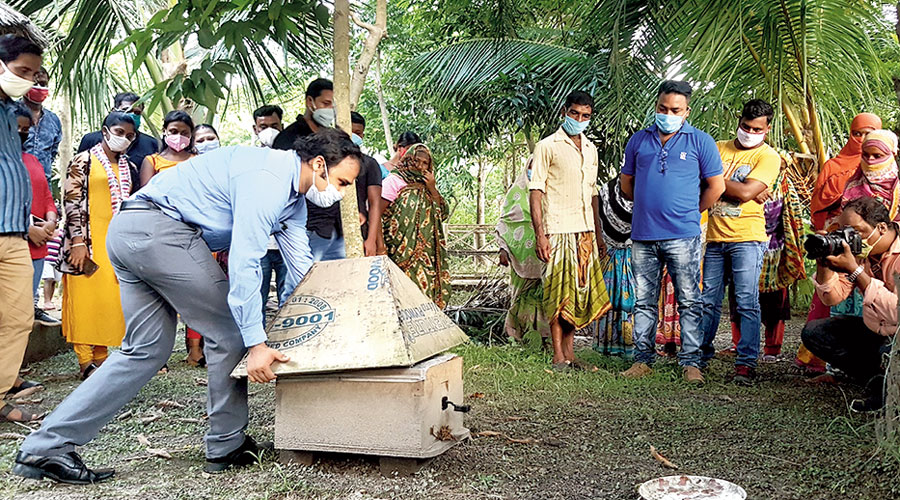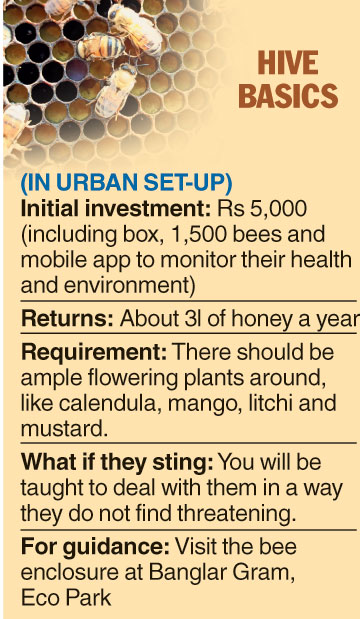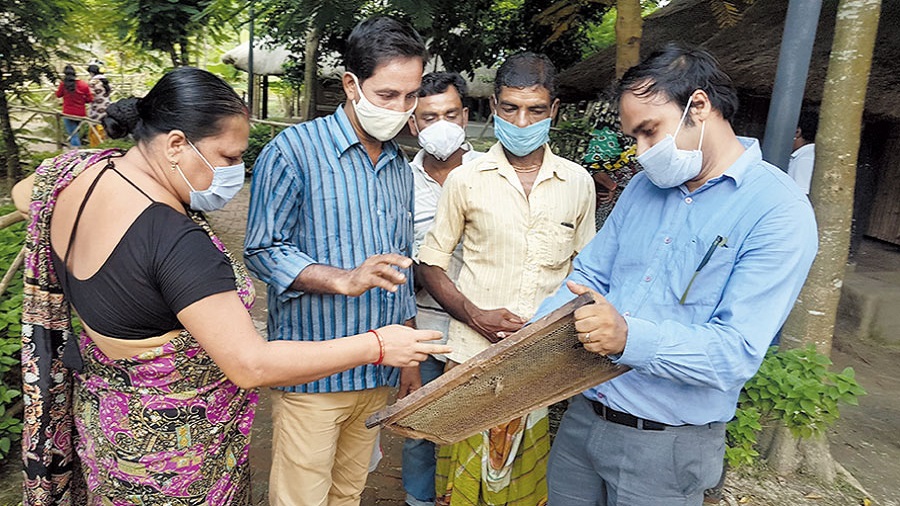At a time when unemployment is on the rise, an initiative has been introduced in New Town to help people earn on the side.
It has to do with rearing bees and will also help increase greenery.
On September 4, residents of nearby villages had been invited to Eco Park to be familiarised with beekeeping. Arijit Das, an expert in the field, explained the stakes. “Besides honey, bees produce wax that has a huge demand in the pharmaceutical industry. It forms the base of medicines, moisturisers and lipsticks,” he said.
Debashis Sen encouraged the villagers to seize the opportunity. Sen is chairman of New Town Kolkata Development Authority (NKDA) and chairman cum managing director of Housing and Infrastructure Development Corporation (Hidco), that runs Eco Park. “We are not asking you to quit your day job but to add beekeeping to your portfolio for some additional income. You have an expert trainer for guidance and the whole project will be good for the environment.”

A frame where bees deposit honey Sourced by the Telegraph
The outreach programme is an initiative of Schoppen Solutions, of which Das is the founder. Last year, the bee corridor project had won a start-up contest and was incubated by Webel-BCC&I Tech Incubation Centre. Das then got a chance to build a prototype of his project at Eco Park, which was formally launched in March 2020, at the Banglar Gram enclosure.
“Once you understand the basics, two hours of effort a day is enough to maintain bee colonies,” Das explained to the villagers. “But the most important factor is environment. Bees need lots of flowers nearby to suck nectar from. This is what they convert into honey and store in honeycombs that they create using beeswax. The excess honey is extracted by humans.”
The villagers expressed curiosity about the project. “I don’t know anything about bees but I’m a farmer growing pumpkins, bitter gourd and jhinge in Rajarhat. If my neighbours start keeping bees I shall too,” said Sudhangsu Mondal.
Tapas Biswas may be a labourer but he grew up in the Sundarbans, a region renowned for honey. “My father would head to the forest to get honey. This is a lucrative profession and I might take it up,” he said.

Hive basics The Telegraph
Das encouraged the individuals to form a self-help group. “If an entire neighbourhood joins the cause everyone will grow flowering plants for the bees. It will be more conducive than a single person growing plants on his terrace,” he explained.
Bees at home
Das has two separate designs of bee boxes for rural and urban folk. While the former, explained above, is targeted at maximum honey production, the one for urban folk is more aesthetic and meant for self-consumption of honey.
The box, to be launched later this month, can be mounted on a wall and has transparent exteriors for enthusiasts to watch the bees at work inside.
“It is linked to an app that will inform the user whenever anything is amiss or give estimates about the production of honey,” says Das. It costs about Rs 5,000, including the app and some 1,500 bees. It should produce about 3l of honey a year,” says Das.
Any home in New Town or Salt Lake can practise apiculture successfully, provided there are flowers around — mustard, calendula, litchi, and mango are most suitable.
As for the fear of stings, Das promised to teach handling bees in a way they do not find threatening. “Besides, bees die after stinging so they only sting as a last resort. They won’t harm you unless you’re out to destroy their colony,” he says.











